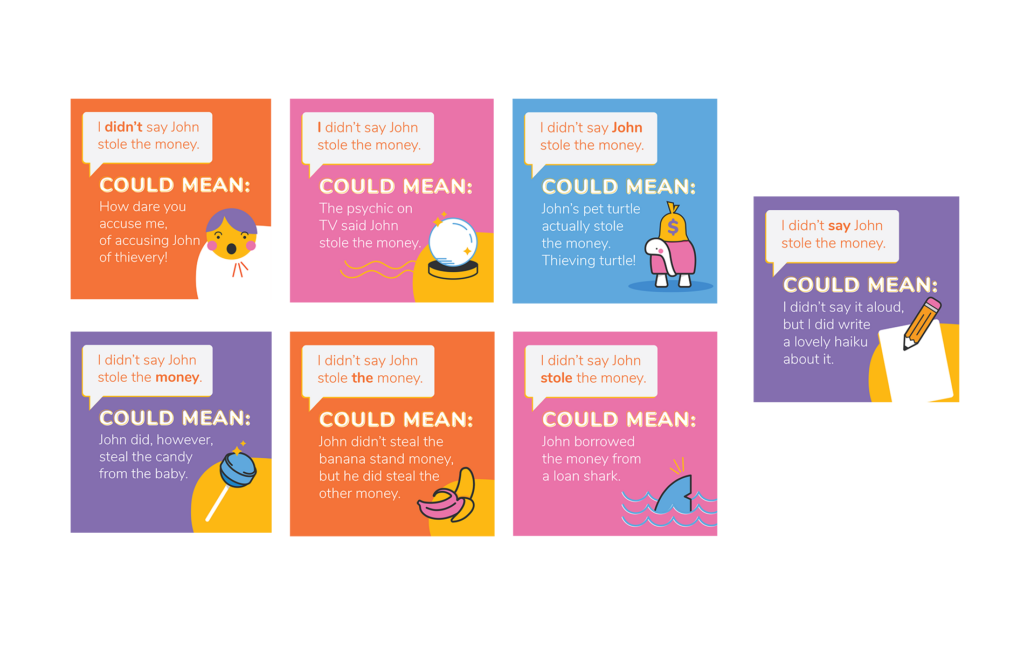
Have you ever gotten the “we need to talk” text?
I’m convinced that this text unlocks some horrible superpower our brain has to remember literally every mistake we ever made and everything we ever said that involved the sender of the text. Lucky for me, my brain also loves to play out dramatic scenarios of just how awful the conversation might be. But most of the time, we come out of these conversations realizing we had nothing to worry about in the first place.
This is a classic example of miscommunication—the plague of the tech age. So how do we avoid jumping to conclusions or sending messages that might be misinterpreted?
Let’s go over some tips for how to avoid miscommunication online.
Why We Miscommunicate
Miscommunication can happen more often over text or email. We’re saying the same words and phrases we would in person, so it’s basically the same thing, right? Not quite. There are a few reasons why we could misunderstand each other’s meaning. Let’s break down a few:
Communication Isn’t Just Words
In verbal communication, we use body language and tone—among other things—to explain what we mean. Without these things, it’s hard to know everything implied beyond word definition. For example, the sentence “I didn’t say John stole the money” could have seven different meanings depending on the word you emphasize. It’s no wonder we misread texts!

We Jump to Conclusions
When we don’t understand a message fully, we tend to “fill in the blanks” with our own unfounded assumptions. We create these assumptions based on our own insecurities and feelings; if we are prone to feeling criticized, we will likely think the message is critical.
Relationships Matter
Our relationship with a person also affects the conclusions we draw from their message. Say you have a rocky relationship with your boss and then they reply to a long email with just one sentence. Yikes. You think they’re brushing you off, but if you had a close relationship with them, you might think “that’s not like them—they must be super busy right now.”
How to Avoid Miscommunication
Miscommunication happens everywhere—not just in the office—which is why it’s important for you and your children to know how to overcome it.
Don’t overreact.
We all secretly like to be a little dramatic, but when it comes to improving communication, it’s best to save the drama for the stage. If you receive a message that comes across as passive aggressive or rude, don’t overreact—step back and take a breath.Try counting to 10 (or maybe 100) before you respond. See if there is any other way you could interpret the message, and if there isn’t, try to understand why it might have been sent. Avoid sending something hurtful back—retaliation only makes things worse and won’t clarify anything.
Call or Video Call When Possible
If you are ever unsure about a response, resort to phone or video call. These mediums of communication can help smooth out any misunderstanding that might have happened. Communication is much easier when you can hear someone’s tone of voice or see their facial expressions.
Over Communicate
We all know that person who responds to literally everything with an “okay” or a “sounds good.” Maybe you are that person. If that’s the case, it’s time for some introspection. You probably have a good explanation for why your messages are short or blunt, but if you don’t say it, it makes no difference. With no explanation, the receiver is left trying to come up with one on their own, which usually ends up being more like “they hate me” than “they must be busy.” Another way to soften a message that might be misinterpreted is by using emojis—just make sure the relationship and setting is appropriate before you get too crazy with your emoji selection. Remember: hearts are for family, not your boss.
Be Considerate About Response Time
No one else knows what’s happening in your head. You might read a message and think, “oh, I’ll just respond later” (which is usually a lie). But the recipient of your message might think you’re ignoring them or don’t care enough to respond quickly. Try to respond in a reasonable amount of time, or at least let them know you’re busy and will get back with them later.
Learning how to communicate correctly—and avoid misunderstandings—can be learned even at a young age. That’s why more parents are introducing their children to technology early on with child-safe phones like the ones Troomi offers. These phones unlock features as your child learns safe and responsible tech skills, providing a great way to bring tech into your home safely.
